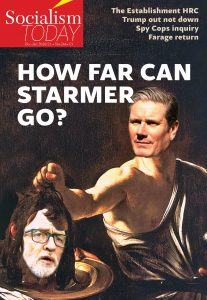
In any battle the tactical details and their timing always have an element of the accidental and unexpected in them. Keir Starmer’s suspension of Jeremy Corbyn from the Labour Party on October 29 and – after the decision by a disciplinary panel of the party’s National Executive Committee (NEC) to reinstate Corbyn on November 17 – the withdrawal of the parliamentary whip, may not have followed a prepared script.
It could be, as the former Labour Party chair and Corbyn-supporting MP Ian Lavery said of the October suspension, that there was “a miscalculation” involved, at least initially. Others, like the columnist Owen Jones, have spoken of Starmer’s ‘panicked’ reaction to events.
But a move against Corbyn himself had been an inherent possibility in the single-minded campaign against ‘Corbynism’ that Starmer has conducted since his ascent to the Labour leadership earlier this year.
Read more